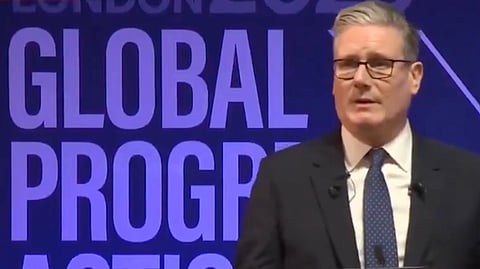

In a move to supposedly curb illegal migration, Prime Minister Keir Starmer has plans Friday for mandatory digital identity cards, dubbed "BritCards," requiring all working adults to hold a phone-based ID by July 2029.
Critics say the IDs are a significant step towards a China-like social credit system that severely restricts personal freedoms.
The scheme, outlined at the Global Progress Action Summit, mandates the ID for right-to-work checks, containing users' names, dates of birth, photos, and residency status for biometric verification.
While free and not requiring physical carriage, the policy has ignited alarms over privacy and surveillance in a nation already grappling with rising speech restrictions.The government claims the system will deter undocumented workers by streamlining employer verifications, reducing small boat crossings and visa overstays.
It builds on existing GOV.UK digital wallets and eVisas, promising easier access to services like welfare and childcare. Starmer framed it as essential for border security amid populist pressures from Reform UK.
Critics, however, decry it as a gateway to authoritarian control. Eight civil liberties groups, including Liberty and Article 19, warned in a letter to Starmer that centralizing personal data risks profiling marginalized communities and creating "an enormous hacking target."
Conservative leader Kemi Badenoch vowed opposition, arguing it excludes non-users from citizenship rights. Liberal Democrats called it "nonsensical," fearing forced data handover for daily life.
An online petition against the IDs has neared 900,000 signatures. SNP leader John Swinney labeled it an infringement on Scots' identities. This comes against a backdrop of escalating free speech curbs.
UK police now arrest over 30 people daily—more than 12,000 annually—for "offensive" online posts under the Communications Act 2003 and Malicious Communications Act 1988, a 121% rise since 2017. In 2024, 1,160 prosecutions followed, though only 137 led to immediate jail terms, mostly under two months.
High-profile cases include comedian Graham Linehan's 2025 Heathrow arrest for trans-related tweets and calls for mass migrant deportations. Reform
UK's Nigel Farage likened the UK to a "tin pot Third World dictatorship." Freedom House's 2025 report notes UK declines in expression, citing a broader extremism definition post-October 2023 attacks that risks targeting Muslims and chilling debate.
Critics fear digital IDs could enable real-time speech monitoring, linking identities to online activity and amplifying surveillance under Prevent strategies.
With hate crimes up 25%—10,484 religion-based incidents in 2023–24—tensions simmer. As consultations begin, opponents urge Parliament to reject what they call a "thin end of the wedge" toward total state oversight, echoing post-WWII ID card abolition. "This isn't security—it's subjugation," said Liberty's Silkie Carlo.
Former UK Prime Minister Boris Johnson said in an online statement, "I will never accept a government ID card. I will never use one. If asked to produce one I will refuse - and I hope you do, too."
The Canadian government is actively advancing a national digital identity program as part of its Digital Ambition strategy, outlined in the 2024-25 update by the Treasury Board of Canada Secretariat.